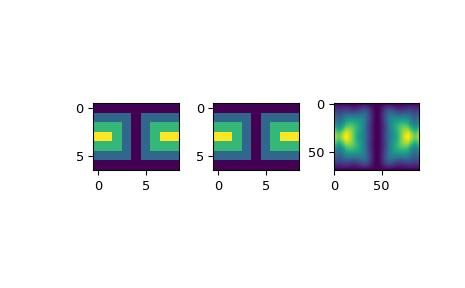scipy.interpolate.LSQSphereBivariateSpline¶
-
class
scipy.interpolate.LSQSphereBivariateSpline(theta, phi, r, tt, tp, w=None, eps=1e-16)[source]¶ Weighted least-squares bivariate spline approximation in spherical coordinates.
Determines a smooth bicubic spline according to a given set of knots in the theta and phi directions.
New in version 0.11.0.
- Parameters
- theta, phi, rarray_like
1-D sequences of data points (order is not important). Coordinates must be given in radians. Theta must lie within the interval (0, pi), and phi must lie within the interval (0, 2pi).
- tt, tparray_like
Strictly ordered 1-D sequences of knots coordinates. Coordinates must satisfy
0 < tt[i] < pi,0 < tp[i] < 2*pi.- warray_like, optional
Positive 1-D sequence of weights, of the same length as theta, phi and r.
- epsfloat, optional
A threshold for determining the effective rank of an over-determined linear system of equations. eps should have a value between 0 and 1, the default is 1e-16.
Notes
For more information, see the FITPACK site about this function.
Examples
Suppose we have global data on a coarse grid (the input data does not have to be on a grid):
>>> theta = np.linspace(0., np.pi, 7) >>> phi = np.linspace(0., 2*np.pi, 9) >>> data = np.empty((theta.shape[0], phi.shape[0])) >>> data[:,0], data[0,:], data[-1,:] = 0., 0., 0. >>> data[1:-1,1], data[1:-1,-1] = 1., 1. >>> data[1,1:-1], data[-2,1:-1] = 1., 1. >>> data[2:-2,2], data[2:-2,-2] = 2., 2. >>> data[2,2:-2], data[-3,2:-2] = 2., 2. >>> data[3,3:-2] = 3. >>> data = np.roll(data, 4, 1)
We need to set up the interpolator object. Here, we must also specify the coordinates of the knots to use.
>>> lats, lons = np.meshgrid(theta, phi) >>> knotst, knotsp = theta.copy(), phi.copy() >>> knotst[0] += .0001 >>> knotst[-1] -= .0001 >>> knotsp[0] += .0001 >>> knotsp[-1] -= .0001 >>> from scipy.interpolate import LSQSphereBivariateSpline >>> lut = LSQSphereBivariateSpline(lats.ravel(), lons.ravel(), ... data.T.ravel(), knotst, knotsp)
As a first test, we’ll see what the algorithm returns when run on the input coordinates
>>> data_orig = lut(theta, phi)
Finally we interpolate the data to a finer grid
>>> fine_lats = np.linspace(0., np.pi, 70) >>> fine_lons = np.linspace(0., 2*np.pi, 90)
>>> data_lsq = lut(fine_lats, fine_lons)
>>> import matplotlib.pyplot as plt >>> fig = plt.figure() >>> ax1 = fig.add_subplot(131) >>> ax1.imshow(data, interpolation='nearest') >>> ax2 = fig.add_subplot(132) >>> ax2.imshow(data_orig, interpolation='nearest') >>> ax3 = fig.add_subplot(133) >>> ax3.imshow(data_lsq, interpolation='nearest') >>> plt.show()

Methods
__call__(theta, phi[, dtheta, dphi, grid])Evaluate the spline or its derivatives at given positions.
ev(theta, phi[, dtheta, dphi])Evaluate the spline at points
Return spline coefficients.
Return a tuple (tx,ty) where tx,ty contain knots positions of the spline with respect to x-, y-variable, respectively.
Return weighted sum of squared residuals of the spline approximation: sum ((w[i]*(z[i]-s(x[i],y[i])))**2,axis=0)
